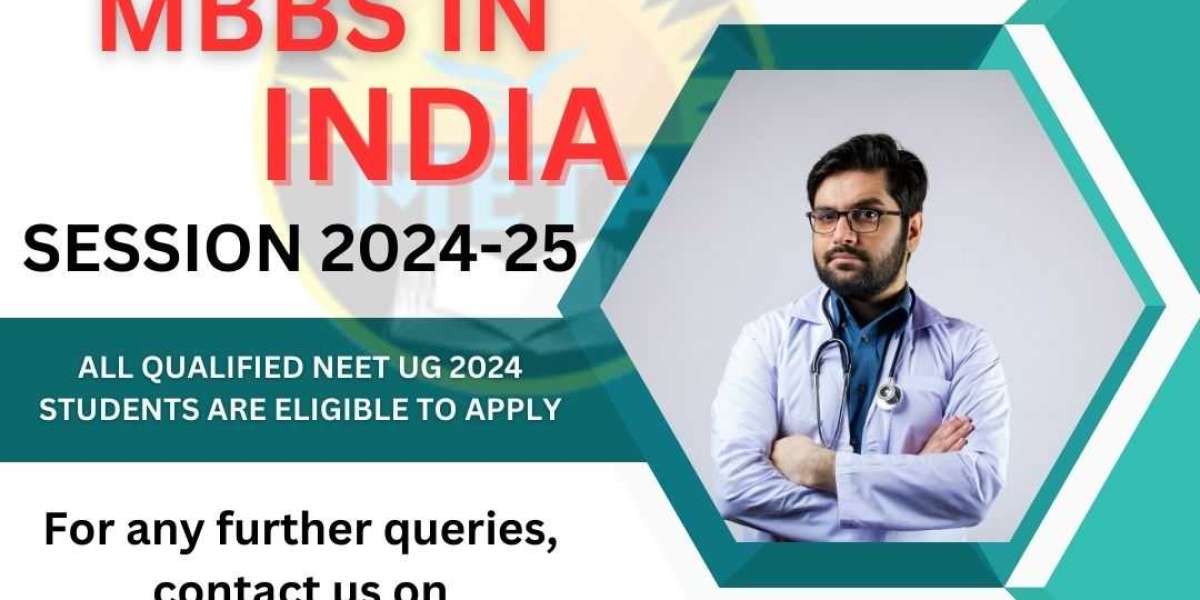Pursuing an MBBS degree in India is a significant achievement and a dream for many aspiring doctors. India's medical education system is globally recognized for its rigorous training, comprehensive curriculum, and extensive clinical exposure. Whether you're a student from India or abroad, understanding the MBBS admission process is crucial for securing a seat in one of the country's prestigious medical colleges. This article provides a detailed guide on MBBS admission in India, covering eligibility criteria, entrance exams, top medical colleges, the admission process, and other important considerations.
Why Choose MBBS in India?
India is home to some of the most prestigious medical colleges and universities, offering a blend of quality education, state-of-the-art facilities, and a rich tradition of medical research and innovation. Here are some compelling reasons why pursuing an MBBS in India is an excellent choice:
High-Quality Education: Indian medical colleges follow a rigorous curriculum that covers both theoretical and practical aspects of medicine. Students receive hands-on training in real-world clinical settings, ensuring they are well-prepared for the challenges of the medical profession.
Global Recognition: An MBBS degree from India is recognized and respected worldwide. Graduates from Indian medical colleges are eligible to practice medicine in many countries after clearing the required licensing exams.
Affordable Fees: Compared to Western countries, the cost of medical education in India is significantly lower, especially in government colleges. This makes India an attractive destination for students from various economic backgrounds.
Diverse Clinical Exposure: India’s diverse population and the prevalence of various diseases provide medical students with extensive clinical exposure. This experience is invaluable in developing diagnostic and treatment skills.
Research Opportunities: Many Indian medical institutions emphasize research, offering students the chance to participate in groundbreaking medical research projects. This exposure helps students stay at the forefront of medical advancements.
Eligibility Criteria for MBBS Admission in India
To secure admission to an MBBS program in India, candidates must meet specific eligibility criteria:
Educational Qualification: Candidates must have completed their 10+2 or equivalent examination with Physics, Chemistry, and Biology as core subjects. English is also a mandatory subject in the qualifying examination.
Minimum Marks Requirement: Candidates from the general category must secure at least 50% aggregate marks in Physics, Chemistry, and Biology. For candidates from SC/ST/OBC categories, the minimum requirement is 40% aggregate marks.
Age Limit: Candidates must be at least 17 years old by December 31 of the admission year. The upper age limit for general category candidates is 25 years, with a relaxation of up to 5 years for reserved category candidates.
NEET Qualification: All candidates must qualify for the National Eligibility cum Entrance Test (NEET) UG to be eligible for MBBS admission in India. NEET is the only entrance exam for MBBS admission across all medical institutions in the country.
Entrance Exam: NEET UG
The National Eligibility cum Entrance Test (NEET) UG is the gateway to MBBS admission in India. Conducted by the National Testing Agency (NTA), NEET UG is a national-level entrance exam that assesses candidates' knowledge in Physics, Chemistry, and Biology.
Key Details About NEET UG:
Exam Pattern: NEET UG consists of 180 multiple-choice questions (MCQs) divided into three sections: Physics (45 questions), Chemistry (45 questions), and Biology (90 questions). The exam is conducted in pen-and-paper mode and lasts for 3 hours.
Marking Scheme: Each correct answer is awarded 4 marks, while 1 mark is deducted for each incorrect answer. Unanswered questions do not carry any penalty.
Syllabus: The NEET UG syllabus is based on the NCERT curriculum for classes 11 and 12. It covers essential topics in Physics, Chemistry, and Biology.
Scoring and Ranking: NEET UG scores determine the rank of candidates, which is then used during the counseling process for seat allocation in medical colleges.
Importance of NEET UG:
NEET UG is the sole entrance exam for MBBS admission in India, making it highly competitive. A high score in NEET UG is crucial for securing admission to a top medical college.
NEET UG scores are also used for admission to other undergraduate medical courses, such as BDS (Bachelor of Dental Surgery), BAMS (Bachelor of Ayurvedic Medicine and Surgery), BHMS (Bachelor of Homeopathic Medicine and Surgery), and BVSc (Bachelor of Veterinary Science).
Top Medical Colleges in India
India boasts several prestigious medical colleges that are known for their academic excellence, research facilities, and clinical training. Here are some of the top medical colleges in India:
All India Institute of Medical Sciences (AIIMS), New Delhi: AIIMS is the most prestigious medical institution in India, known for its world-class education, research, and patient care. AIIMS graduates are highly respected worldwide.
Christian Medical College (CMC), Vellore: CMC is renowned for its clinical training and research programs. It is one of the top choices for students seeking a comprehensive medical education in India.
Maulana Azad Medical College (MAMC), New Delhi: MAMC offers excellent clinical exposure and is affiliated with several leading hospitals in Delhi, providing students with hands-on experience in various medical fields.
Armed Forces Medical College (AFMC), Pune: AFMC is known for its disciplined environment and offers medical education with a focus on military medical services. Graduates have the opportunity to serve in the Indian Armed Forces.
Kasturba Medical College (KMC), Manipal: KMC is one of the top private medical colleges in India, known for its state-of-the-art infrastructure and experienced faculty.
Jawaharlal Institute of Postgraduate Medical Education and Research (JIPMER), Puducherry: JIPMER is an autonomous institution known for its high standards in medical education and research.
King George's Medical University (KGMU), Lucknow: KGMU is one of the oldest medical institutions in India, offering a rich academic history and extensive clinical training.
Lady Hardinge Medical College (LHMC), New Delhi: LHMC is a premier medical institution for women, known for its strong academic program and clinical training.
The MBBS Admission Process in India
The MBBS admission process in India involves several steps:
NEET UG Registration: Candidates must register for the NEET UG exam by filling out the application form on the NTA website. The application process involves providing personal details, uploading necessary documents, and paying the exam fee.
Preparation and Exam: Preparation for NEET UG is crucial, as it is a highly competitive exam. Many students opt for coaching classes or online courses to enhance their preparation. The exam is usually held in May, and the results are announced a few weeks later.
Counseling Process: After the NEET UG results are announced, the counseling process begins. The Medical Counseling Committee (MCC) conducts the All India Quota (AIQ) counseling for 15% of seats in government medical colleges, while the remaining 85% of seats are filled through state-level counseling. Private medical colleges also conduct their own counseling based on NEET scores.
Seat Allotment and Admission: Based on the NEET rank, candidates are allotted seats in medical colleges during the counseling process. Once a seat is allotted, candidates must report to the respective college, complete the admission formalities, and pay the required fees.
Document Verification: Candidates must provide original documents during the admission process, including their NEET scorecard, 10+2 mark sheets, identity proof, and other relevant certificates.
Commencement of Classes: After completing the admission process, students begin their MBBS program, which typically spans five and a half years, including a one-year mandatory internship.
Fee Structure for MBBS in India
The cost of pursuing an MBBS degree in India varies depending on the type of institution:
Government Medical Colleges: Fees for MBBS in government colleges are relatively low, ranging from INR 10,000 to INR 1,00,000 per year. These institutions offer subsidized education, making them an affordable option for many students.
Private Medical Colleges: Fees in private medical colleges are significantly higher, ranging from INR 10 lakhs to INR 25 lakhs per year. Some top private colleges may charge even more.
Deemed Universities: Deemed universities generally have higher fees, ranging from INR 15 lakhs to INR 40 lakhs per year.
In addition to tuition fees, students should also consider additional costs such as hostel accommodation, books, and other academic expenses.
Key Considerations for MBBS Aspirants
Start Early: Preparing for NEET UG requires time and dedication. Start your preparation early, ideally from class 11, to ensure you have ample time to cover the syllabus and practice mock tests.
Choose the Right Coaching: If you opt for coaching, choose a reputable coaching institute with experienced faculty and a proven track record of success in NEET UG.
Practice Regularly: Regular practice is essential for success in NEET UG. Solve previous years' question papers and take mock tests to improve your speed and accuracy.
Stay Updated: Keep yourself updated with the latest information about NEET UG, including exam dates, syllabus changes, and important announcements from the NTA.
Stay Healthy: Preparing for NEET UG can be stressful, so it’s important to maintain a healthy lifestyle. Ensure you get enough sleep, eat a








